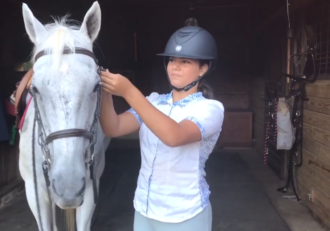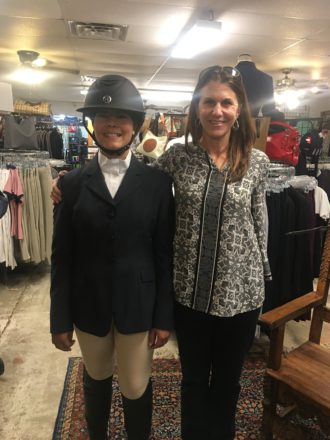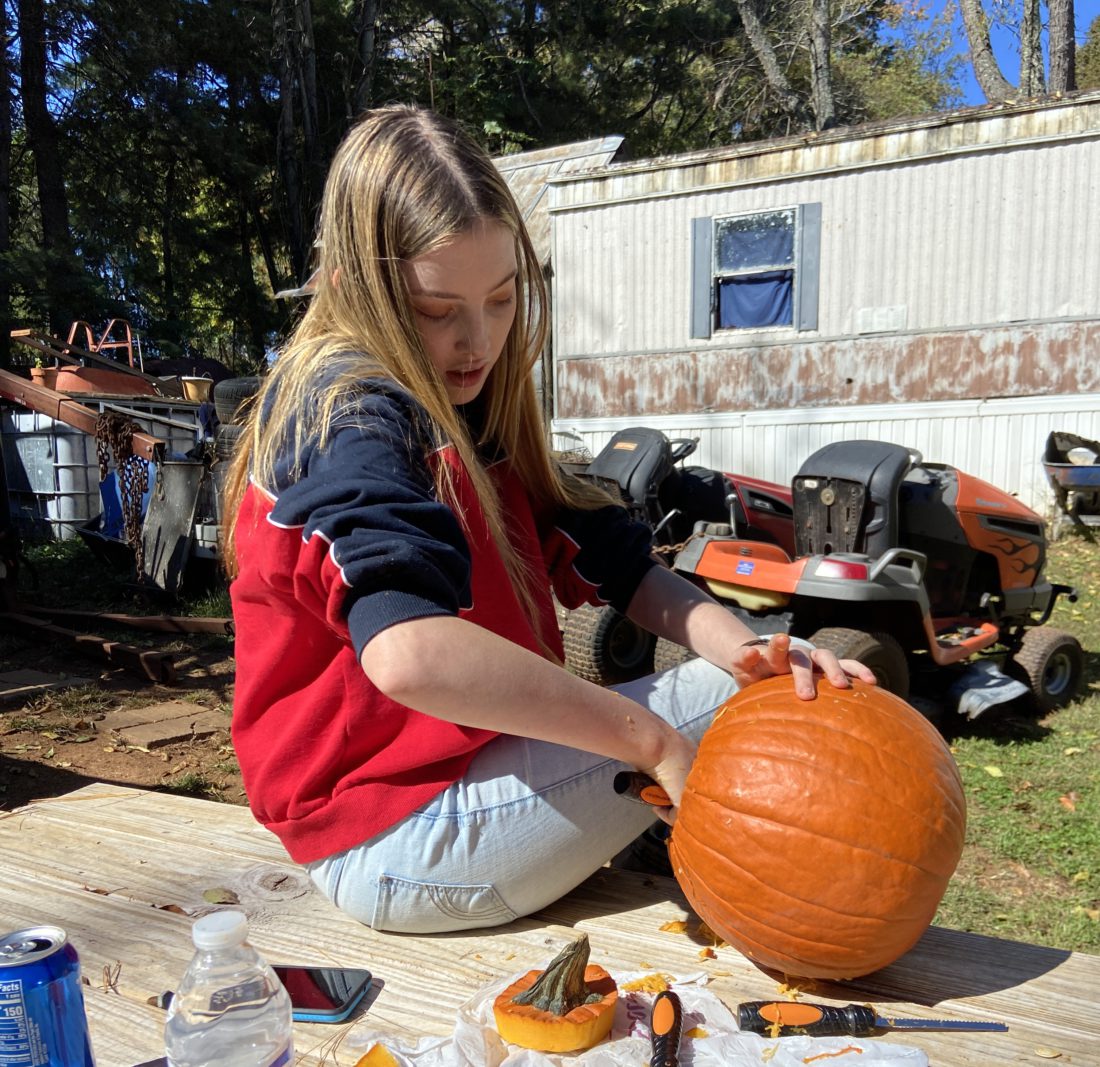When she was little, Susan Kocher thought vacations would never arrive. Time seemed to slow down, and those pre-getaway days seemed to last forever. That’s how the current pandemic feels to kids, she says. And that’s definitely the case at times for Malia, her “Little Sister.” The two Polk County residents were matched by Big Brothers Big Sisters of Western North Carolina nearly three years ago.
For “Bigs” like Kocher, supporting their “Littles” during this time of extended social separation, when kids desperately miss hanging out with friends, is critically important — and particularly difficult.
“I can’t imagine being a kid and dealing with the pandemic on top of everything else, like worrying about your parents’ jobs,” notes Kocher.
But it’s trying for the Bigs as well.
“Being on the phone with an 8- or 9-year-old is hard,” Haywood County resident Anna Belle Lamar says about her Little Sister. “We have very short conversations, like, ‘What did you eat today that was good?’ and ‘What did you do today that made you happy?’”
When the pandemic shut things down last spring, however, telephone calls and online chats were about all that Bigs and Littles in North Carolina had left. The 38-year-old Asheville-based nonprofit asked its matches in Buncombe, Burke, Cherokee, Graham, Haywood, Henderson, Jackson, Macon, Polk and Swain counties to meet only online or in backyards, far apart and masked up.
“It was quite an adjustment,” says Lucy Hollister, a Buncombe County Big Sister. She and Miley did a lot of texting and Facebook messaging, but after about a month their enthusiasm for their new virtual reality stalled, though they continued to stay in touch.
Kocher and Malia were also having a hard time, in part because of how far they’d already come. Kocher, an avid horsewoman with a farm in Tryon, had introduced Malia to riding. After starting the girl out on Emma, a prized but gentle show horse, Kocher signed Malia up for riding lessons and saw her Little Sister’s self-confidence and attitude improve. That was especially true after Kocher helped Malia, who’d once despaired over her grades, build a lighthouse for a science project.
Critical support
With more than 235 affiliates around the country, Big Brothers Big Sisters of America serves kids ages 6-18. In WNC, the cutoff for new participants is age 15, though once they’re in the program, they can continue through high school graduation.
In a 2009 study conducted by Civic Enterprises on the organization’s behalf, 97% of the Littles surveyed nationwide said that working hard in school was “very important,” and 94% said the same about graduating from college. And in an online survey conducted by Harris Interactive that year, 90% of respondents who’d aged out of the program said their relationship with their Big had helped them make better choices in childhood, and 76% said their Big had helped them learn to distinguish right from wrong.

Kocher, meanwhile, says she vividly remembers the day she and Malia brought the finished lighthouse to school. A counselor told Kocher, “I just want you to know that Malia never stops smiling now,” adding, “I could never get her to smile before.”
That was gratifying news. But when the country started shutting down last spring, Kocher felt her primary responsibility toward Malia had shifted to helping keep her healthy. And that meant no more riding and visiting, a change that was difficult for both of them.
Kocher, an actor, biopharmaceutical sales representative and generally community-minded person, saw her own busy life grind to a halt. Nonetheless, the eight-year cancer survivor refused to let the pandemic stop her — or Malia. “We’re going to find a way to get through this,” she told her Little.
Every Saturday, Kocher fixed a hot breakfast to take to Malia and her extended family. They live with Malia’s grandmother, a health care worker who tends to patients in South Carolina on weekends.
In between those weekly visits, Kocher and Malia would speak on the phone and visit via FaceTime. It was hard to get Malia to open up during those remote conversations, so Kocher would try to break the ice by sharing her own feelings.

“I told her I felt like I could never get out of the house,” she recalls. “Just the boredom and the feeling that this is never going to end.”
Malia confessed to being bored as well, so Kocher repeated what she’s always said, “that I was that person who was concerned about her well-being. I am your champion: I am the one that wants to make sure that you are always OK.”
Those are the kinds of words a child really needs to hear, especially when her world has shut down, says Lamar, the director of a Waynesville-based backpacking ministry.
“Just having another person that is not related to you say that you’re loved and that you’re awesome, that’s great,” she explains. And while Lamar is quick to add that her own Little also hears that a lot at home, “Being connected to more adults is a good thing. Someone is telling you that you’re really smart, that you can do this, you’re a joy to be around.”
And though, like a lot of preteens, Lamar’s Little Sister tends to dismiss that kind of talk, Lamar remains unfazed, saying, “She hears it — and I believe it.”
Hopes and dreams
In mid-September, after North Carolina began to open up again, the WNC chapter gave matches the option of resuming excursions, provided that both the Big and the Little’s parents or guardians signed a waiver requiring both parties to be masked and socially distanced at all times.
Nonetheless, Miley’s father hasn’t felt comfortable about his daughter and Hollister riding in the same car. So most of their visits have been in Miley’s backyard, at the big picnic table where they’ve carved jack-o’-lanterns and done homework.
Still, the young girl’s spirits have ebbed and flowed, her Big Sister reports.
“It’s really hard for her not to see her friends, I think,” says Hollister. “She’s been telling me about her extended family reaching out, calling and Facebooking, so she’s getting a lot of interaction virtually. A lot of kids don’t love online learning, but she’s getting used to it.”
Ultimately, being extra attentive to Miley’s well-being during the lockdown has made their relationship stronger, Hollister believes. “The pandemic has rocked everyone’s lives, but if it taught us anything, it’s how important our relationships are,” she points out. “I’m glad Miley and I have been able to establish that.”
Malia and Kocher are also back in the saddle.
Malia has returned to riding and is now a “barn rat” who hangs out with a “tribe” of kids at a nearby horse farm soaking up the equestrian life, her Big Sister reports. She’s learned how to clip horses (i.e., trim their coats) and is teaching herself how to braid tails and manes. She created a recipe for a horse treat that Kocher thinks could challenge a national brand, and she rides for an Interscholastic Equestrian Association team affiliated with the A1 Equestrian horse farm in Campobello, S.C.
“Malia’s overall confidence has just blossomed,” notes Kocher. “She’s a pretty optimistic girl now because of her outside activities. I said to Malia, ‘Your friends might be working at McDonald’s in high school, but you might be braiding horses.’ We always talk about hopes and dreams and how we’re doing to achieve our goals.”
Big Brothers Big Sisters of Western North Carolina is recruiting Bigs and Littles throughout the mountains. Learn more at bbbswnc.org. Paul Clark is the organization’s communications coordinator.




Before you comment
The comments section is here to provide a platform for civil dialogue on the issues we face together as a local community. Xpress is committed to offering this platform for all voices, but when the tone of the discussion gets nasty or strays off topic, we believe many people choose not to participate. Xpress editors are determined to moderate comments to ensure a constructive interchange is maintained. All comments judged not to be in keeping with the spirit of civil discourse will be removed and repeat violators will be banned. See here for our terms of service. Thank you for being part of this effort to promote respectful discussion.